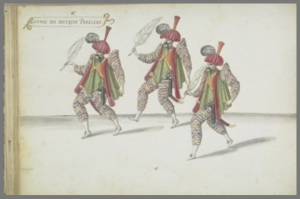27-28 April 2023
Register to attend (Registrations are now closed)
The second ‘Spectacular Orientalism’ conference organised by the Centre for Comparative Literature at Goldsmiths, University of London, in collaboration with the Society for European Festivals Research.

Following the success of the first Spectacular Orientalism conference in June 2022, largely devoted to the Ottoman Empire and the image of the Turk, this follow-up conference will focus more specifically on Asia and the Far East. These two further days of talks and discussion will explore new perspectives on the representation of the Orient in early modern European art and performance in a period that witnessed the founding of the first Christian mission in Japan by the Portuguese (1549), the establishment of the English, Dutch and French East India Companies at the turn of the seventeenth century, the rise of European travel to Persia under the Safavid dynasty and the resulting spate of publications.
The conference will examine different settings in which the Orient was imagined and talked about. In particular it will interrogate various types of public display common in early modern societies, in which the self-projection of power and identity was often interwoven with the spectacle of the Other: including courtly and public festivals, civic ceremonies and rituals. It will also consider staged productions, notably operas and ballets, whose multisensorial character added to the inherent orientalist tendency towards display, while heightening the attraction of the exotic for their audiences.
Edward Said has argued that the spectacle in Orientalism was meant to substitute for and so mask the crude violence of the colonial enterprise. But was this the case of orientalist representations in the C16th and C17th? On the contrary early modern scholars have shown that, far from arising from a desire of self-enhancement and imperial ambitions, early modern attitudes were in many cases a defensive reaction fostered by a sense of inferiority and vulnerability. Early modern Orientalism was undoubtedly affected by geopolitical factors, notably the expanding Ottoman empire and its advances in Eastern Europe, but also the growing importance of Persia, India, China and Japan in the second half of the C17th. In terms of wealth, power and technology, Europe was inferior to both its Middle Eastern and Far Eastern rivals.
However, it is true that early modern Orientalism relied on genres and aesthetics that allowed for a profound ambiguity towards the imaginary East. Twisted stereotypes, fabrications and misconceptions coexisted with fresh impressions about the Orient and a genuine interest in Eastern cultures, as evidenced in the growing number of travelogues which went to inform performances of the East back in the West. Denigration and fascination were shared in equal measures. Representations also evolved in a way that reflected and revealed Western needs, concerns and agendas, and served as imaginary resolutions of real anxieties about Islamic wealth and might, or a nostalgic feeling of backwardness towards Far Eastern opulence.
We look forward to papers that address the rhetorical multiplicity and instability of early modern Orientalism in the performing arts, sketch its possibilities for change in the C18th or contrast the imaginary construct of the Orient in public spectacle with the real appearance of Eastern envoys, who took the opportunity offered by their official welcome to project their culture and religion to the delight of onlookers.
The Conference will take place online. Register to attend – Registrations have now closed (registration is free but it is required to receive the link to attend)
